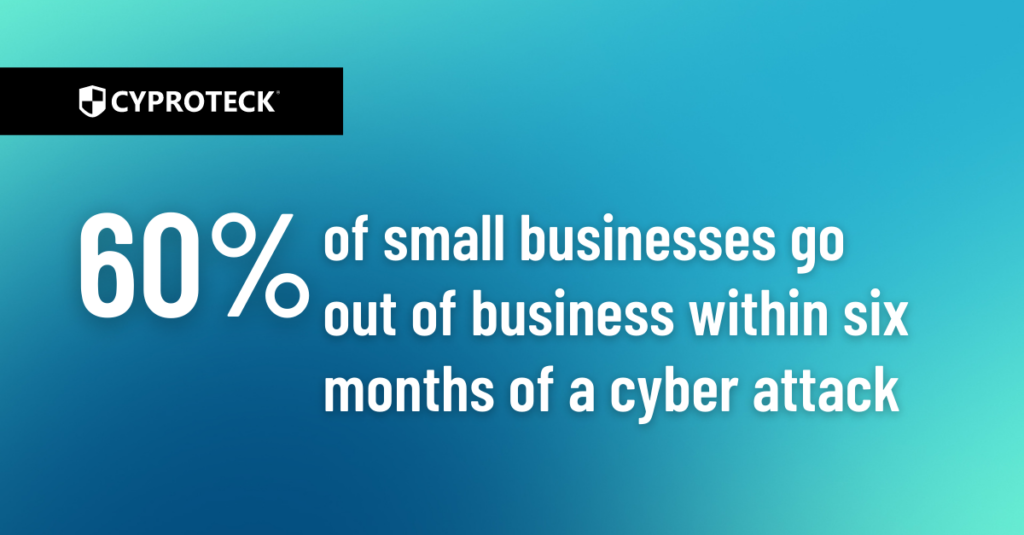
-
cheriegriffithdunn
- April 25, 2023

Think your business is too small to be a target for cybercrime? Think again.
Small businesses are increasingly becoming targets of cyber-attacks, and the consequences can be devastating. While larger organizations often have robust cybersecurity measures in place, small businesses may lack the necessary resources and expertise to effectively protect against cyber threats. Let’s explore why small businesses are particularly vulnerable to cyber-attacks.
Lack of Resources and Expertise
Small businesses often have limited budgets and may not prioritize cybersecurity due to cost constraints. According to a study by the National Small Business Association (NSBA), 45% of small businesses reported that they lack the budget for cybersecurity measures [^1^]. Additionally, small businesses may not have dedicated IT departments or cybersecurity experts on staff, making it challenging to effectively implement and maintain cybersecurity measures. This lack of resources and expertise can leave small businesses vulnerable to cyber-attacks, as hackers often target businesses with weak security measures.
Limited Awareness and Training
Many small businesses may not fully understand the risks and implications of cyber-attacks, leading to a lack of awareness and training among employees. According to a report by Verizon, 58% of cyber-attack victims in 2018 were small businesses [^2^]. Furthermore, the 2020 Data Breach Investigations Report by Verizon found that 30% of small businesses had employees who fell victim to phishing attacks, one of the most common types of cyber-attacks [^3^]. This highlights the need for comprehensive cybersecurity education and training programs for small businesses to raise awareness about the risks and equip employees with the knowledge and skills to identify and mitigate cyber threats.
Reliance on Third-Party Vendors and Partners
Small businesses often rely on third-party vendors and partners for various services, such as payment processing, data storage, and website hosting. However, this reliance can also introduce vulnerabilities in the supply chain, as cyber-attacks targeting third-party vendors can have a ripple effect on small businesses. According to a report by the Ponemon Institute, 59% of small businesses experienced a data breach caused by a third-party vendor in 2019 [^4^]. It is essential for small businesses to thoroughly vet and monitor their third-party vendors’ cybersecurity practices and ensure that they have robust security measures in place to protect their business data.
Limited Backup and Recovery Measures
Small businesses may not have comprehensive backup and recovery measures in place, which can make them susceptible to data loss and ransomware attacks. The Cyber Readiness Institute found that 43% of small businesses lacked the ability to restore their data from backups after a cyber-attack [^5^]. Ransomware attacks, where hackers encrypt a business’s data and demand a ransom for its release, can be particularly devastating for small businesses without proper backup and recovery measures in place. Implementing regular data backups and testing the ability to restore data can help small businesses recover from cyber-attacks and minimize the impact of data loss.
Small businesses are at a higher risk of cyber-attacks due to limited resources, expertise, awareness, and backup measures. However, implementing strong cybersecurity measures, such as budgeting for cybersecurity, providing comprehensive employee training, thoroughly vetting third-party vendors, and regularly backing up data, can help small businesses safeguard their digital assets from cyber threats. It’s crucial for small businesses to prioritize cybersecurity to protect their sensitive data, financial assets, and reputation. Don’t let your small business fall victim to cyber attacks – take proactive measures to strengthen your cybersecurity defenses and mitigate the risks.
Protect your small business from cyber threats today! Don’t leave your business vulnerable to cyber-attacks. Act now by implementing robust cybersecurity measures, training your employees, vetting your third-party vendors, and regularly backing up your data. Invest in a reliable cybersecurity solution to safeguard your digital assets and ensure the continuity of your business operations. Contact to sign up for a trial of our cybersecurity product to start protecting your business from cyber risks. Don’t wait until it’s too late – prioritize cybersecurity for your small business now!
Secure Your Business. Protect Your Legacy.
Sources: [^1^] National Small Business Association (NSBA) 2019 Year-End Economic Report. Available at: https://nsba.biz/wp-content/uploads
60% According to the US National Cyber Security Alliance
